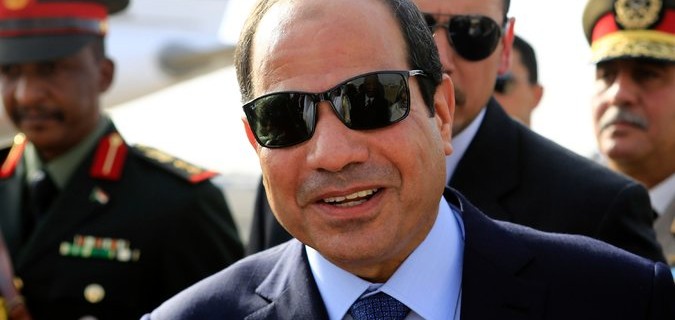Egypt Cuts Tax Breaks for Fuel; Few Protest

When President Anwar el-Sadat of Egypt said he intended to raise the price of flour, rice and other subsidized goods in 1977, he ignited days of riots that left more than 70 people dead and stood as a lasting warning to his successors about the perils of forcing impoverished Egyptians to make do with even less.
So it was a surprise when, as one of his first major policy initiatives, President Abdel Fattah el-Sisi sharply raised fuel prices two weeks ago, cutting deeply into energy subsidies, the most expensive single part of the government’s sprawling and expensive subsidy system. Even more surprising, perhaps, has been the absence of widespread civil unrest.
The relative quiet appeared to signal an acknowledgment among many Egyptians that the fuel prices, which were among the lowest in the world, could not stay that way forever in an economy battered by years of political turmoil and edging ever closer to collapse. And it was a singular demonstration of presidential clout by Mr. Sisi, who used the kind of emotional appeals he has deployed throughout his rise to power to sell the subsidies as necessary, bitter medicine, as well as a public obligation to a charismatic leader.
“You called upon me for a mission — a mission to save a nation,” Mr. Sisi said in a speech after the price increases were announced, invoking the sacrifices of a previous generation during wartime. “The contract between you and me was that you work hard and bear with me,” he said.
While experts on Egypt’s economy praised the boldness of the move, there was also criticism of how it was put into effect, and of a lack of a clear plan to ease the burden on the country’s most vulnerable citizens. There was no easy way to fix the subsidy program in a country where half the population lives around or below the poverty line and relies on government support. Any mistakes carried considerable risks for the government, which faces a more impatient nation since President Hosni Mubarak was thrown out of office by protesters demanding “bread, freedom and social justice.”
“From a political perspective, sooner rather than later was the right thing, but they have not necessarily prepared the Egyptian population most affected by this for what is going to be a tough and long road,” said Steven A. Cook, an expert in Egyptian affairs at the Council on Foreign Relations. “And I’m not convinced there’s enough of a Sisi mystique to carry them along.”
The decades-old system, which provides subsidies for energy and food, including sugar, flour and tea, had eaten up more than 26 percent of the national budget annually. It also was criticized for inefficiency, benefiting companies, for instance, rather than Egypt’s poorest citizens. Reforming the system was seen as an attempt by the Egyptian government not just to plug a budget deficit that reached more than 12 percent of G.D.P., but also to impress international lenders, like the International Monetary Fund, as the country searched for new financing beyond the generous sums provided over the last year by wealthy Persian Gulf states.
The initial announcement of the price increases seemed a rushed affair, made just hours before gas stations changed the prices of several different kinds of fuel on a Friday night, with increases of up to 78 percent. It sparked a panic among taxi drivers, who held sporadic strikes until the government gave instructions on how they should adjust their meters to accommodate the increases.
At least two people were reported killed during an anti-austerity demonstration. Protests in general have become much more perilous for Egyptians over the past year, since the government has made them illegal and showed its willingness to disperse them with deadly force.
Officials promised to control any price inflation, and for days the state daily, Al Ahram, featured pictures on its front page that conveyed government concern: the prime minister, Ibrahim Mehleb, assuaging the concerns of citizens at a mosque and a vegetable stand; Mr. Sisi donating money to a newly established philanthropic fund for Egypt.
“Was it possible to postpone this decision?” Mr. Sisi asked during his speech. “It has been late for years.”
As the government worked to tamp down any shock, economists were divided on the long-term consequences of the price increases for several kinds of fuel, including high-octane gas for more expensive cars as well as diesel fuel, which powers farmers’ irrigation pumps and public buses. The cost of diesel increased about 64 percent, to around $1 per gallon from about 61 cents.
“I’m impressed that he did something substantive that has real political consequences,” said Ragui Assaad, an economist at the University of Minnesota who studies Egypt and said that the budget deficits were “unsustainable for any country.”
But the government had failed to show how it was going to compensate lower income people, he said, adding that subsidy cuts were usually accompanied by announcements of cash transfers to the poor. “That’s where the program failed,” he said.
Reem Abdel Haliem, an economist with the Egyptian Initiative for Personal Rights, said that while she agreed with raising prices on some kinds of fuel to reform the “inefficient” subsidy system, the rising diesel prices in particular could have a “huge inflationary effect.” At the same time, the government had not moved as aggressively to recover other kinds of savings, through steps including shutting down smuggling networks for fuel, that would limit the wider economic damage.
And few plans were announced to expand short-term social protections, or any that reflected a longer-term focus on new initiatives in education, health care or transportation that would benefit lower income people, she said.
“The main objective was to bring money to the government. This is not for social justice,” she said. While acknowledging that the government seemed to have weathered any immediate backlash, she said the danger had not passed. “You will start to see spreading conflicts, because of the limitations on living standards.”
Some of the fears among the public were not driven solely by the price increases. Many have deep doubts about the ability of state institutions to solve Egypt’s economic problems, even as the power of those institutions, long seen as corrupt and inefficient, has seemed to grow over the last year.
The government was further hurt by the perception that many in the country’s current ruling class seemed to be prominent figures from Mr. Mubarak’s era.
“The ruling coalition has been very clear from the beginning. It doesn’t really include the poor,” said Wael Gamal, an economic journalist and researcher. “It is the normal coalition that ruled before January,” he said, referring to the 2011 revolt against Mr. Mubarak and a coalition that included the state bureaucracy, the military and “the very aggressive part of the business community.”
At his Cairo juice stand, Tharwat Rashid, 44, said that despite the government’s promises, prices of basic goods had risen in his neighborhood. Shakedowns by public officials — by inspectors or police officers demanding payouts — also seemed to have gotten more frequent.
“It is the old faces, and old ways, ” he said. “You have to clean a place before you start to build.”
Source: NYT





























